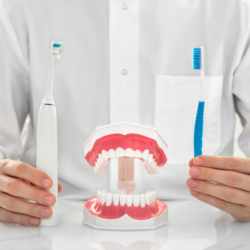During weight loss, sagging skin is common. The deepest layer of the skin is made up of proteins, including collagen and elastin. Collagen, which accounts for 80% of our skin’s structure, provides firmness and strength. Elastin provides elasticity and helps the skin to stay taut.
When we gain weight, the skin stretches over the areas that are getting bigger. Pregnancy is an example of this ‘expansion’: the skin stretches over several months and naturally tightens up in the few weeks following birth.
In contrast, the skin of most overweight and obese people has been stretched for years, often since childhood or adolescence. And when the skin has been stretched considerably over a long period of time, the collagen and elastin fibres are damaged. As a result, they lose some of their ability to retract.
What is sagging skin?
Sagging skin is a phenomenon that can affect anyone, regardless of age or sex. It is an inevitable change in the skin that occurs when collagen and elastin fibres, responsible for the skin’s elasticity and firmness, begin to break down. This can occur naturally with age, but can also be caused by other factors such as rapid weight loss.
This is because the skin is a complex organ that adapts to the shape and size of the body. When you lose weight quickly, your skin may have difficulty adapting to the loss of fat, which can lead to sagging skin. That’s why it’s important to lose weight slowly and steadily to give your skin time to adjust to your new shape.
Sagging skin can cause a loose, sagging appearance, which can be embarrassing for some people. However, it’s important to remember that sagging skin is a natural phenomenon and there’s nothing wrong with loose skin. That said, if sagging skin bothers you, there are solutions to improve the appearance of your skin.
Is collagen effective against sagging skin?
Collagen is a natural protein found in the human body, responsible for the firmness and elasticity of the skin. However, with age or other factors such as excessive exposure to the sun or rapid weight loss, collagen production decreases, which can lead to sagging skin. This is why taking a collagen-based dietary supplement can be beneficial for improving the appearance of the skin.
In fact, taking a collagen-based dietary supplement can help stimulate collagen production in the body, which can improve skin elasticity and firmness. Studies have also shown that taking collagen can help reduce the appearance of fine lines and wrinkles, as well as improving skin texture.
It should be noted, however, that taking a collagen-based dietary supplement should not be considered a miracle solution for sagging skin. It is important to take into account other factors such as diet, exercise and sun protection to maintain skin health. However, taking a collagen-based dietary supplement can be a useful addition to an overall skincare routine to improve the appearance of the skin and prevent sagging.
What the science says about hyaluronic acid supplements for firming the skin
The use of hyaluronic acid-based food supplements is gaining in popularity as a method of improving the health and appearance of the skin. Hyaluronic acid, known for its moisturising and anti-ageing properties, is often promoted as a solution for firming the skin. Let’s take a look at what the science says.
What is hyaluronic acid?
Hyaluronic acid is a molecule naturally present in the human body, particularly in the skin, eyes and connective tissue. It is known for its ability to retain water, playing a crucial role in skin hydration and elasticity.
Are hyaluronic acid supplements effective for tightening the skin?
- Skin hydration: Scientific studies have shown that hyaluronic acid supplementation can improve skin hydration. This increased hydration helps to make the skin more supple and elastic, thereby reducing the appearance of sagging skin.
- Improved skin elasticity: Hyaluronic acid promotes the production of collagen, an essential protein for maintaining skin elasticity. By increasing collagen levels, dietary supplements can help firm the skin and reduce the signs of ageing.
- Anti-ageing effects: Research also suggests that hyaluronic acid may have anti-ageing effects, helping to smooth fine lines and wrinkles. This property is particularly appreciated as part of an overall approach to skin health.
Sport: a formidable weapon in the fight against sagging skin
Resistance training, often combined with weight training or exercise against resistance, has considerable benefits for skin health. According to a study published in 2023, this form of physical activity makes a significant contribution to the regeneration of ageing skin. Here are the key points:
- Reduction in circulating inflammatory factors: Physical activity reduces inflammation levels in the body. This is crucial because chronic inflammation can damage collagen and elastin fibres, which are essential for skin firmness and elasticity. By reducing these inflammatory factors, resistance training helps to preserve the skin’s structure and health.
- Improving extracellular dermal matrices: Extracellular dermal matrices, made up of collagen and elastin, are responsible for the skin’s resistance and elasticity. Resistance exercise stimulates the production of these components, improving the firmness and overall quality of the skin. This stimulation helps to counteract skin slackening, which is particularly beneficial during the weight-loss process.
- Increased blood circulation: Sport promotes better blood circulation, which is essential for healthy skin. Increased circulation brings more oxygen and nutrients to skin cells, facilitating their regeneration and repair. This also contributes to a healthier, more radiant complexion.
- Strengthening the skin barrier: Regular exercise strengthens the skin barrier, the first line of defence against pathogens and external aggression. A strong skin barrier is less susceptible to damage and better able to retain moisture, two key factors in preventing skin slackening.
- Anti-ageing effects: As well as combating sagging skin, resistance training has anti-ageing effects. It helps to slow down certain processes linked to skin ageing, such as loss of elasticity and the appearance of wrinkles.
Exosomes: the new miracle cure for firming the skin?
The emergence of exosomes in the field of dermatology and aesthetics is arousing growing interest, particularly in the fight against sagging skin. These small vesicles, produced by various cell types, could play a crucial role in skin regeneration and firming.
What are exosomes used for?
Exosomes are tiny extracellular vesicles, between 30 and 150 nanometres in size, released by almost every cell in the body. They are involved in cell communication by carrying various types of molecules, such as proteins, lipids, nucleic acids and other bioactives.
The potential of exosomes in skin firming
- Stimulation of collagen production: Exosomes can promote the synthesis of collagen, a key protein for skin firmness and elasticity. By stimulating fibroblasts, the cells responsible for collagen production, exosomes help to reduce skin sagging.
- Improved cell regeneration: Exosomes contain growth factors and proteins that can accelerate the process of cell regeneration. This property is particularly important for repairing damaged tissue and improving skin quality.
- Reducing inflammatory processes: Exosomes can also play a role in modulating inflammatory responses in the skin. By reducing inflammation, they help prevent damage to skin tissue, helping to maintain healthy, firm skin.
- Potential in anti-ageing therapies: Interest in exosomes extends to anti-ageing therapies. Their ability to transport and deliver bioactive molecules directly to target cells makes them a potentially powerful tool in the fight against the signs of skin ageing.
How can I avoid sagging skin after losing weight?
After significant weight loss, sagging skin can become a problem. Here are some key strategies for preventing it:
- Gradual weight loss: Losing weight slowly and regularly allows the skin to gradually adapt to changes in body shape.
- Adequate hydration: Drinking enough water hydrates the skin, improving its elasticity.
- Balanced diet: Eating foods rich in vitamins C and E, as well as collagen and omega-3 fatty acids, contributes to skin health.
- Physical exercise: Physical activity, particularly weight training, can help firm the skin.
- Skin care: Using moisturisers and products containing ingredients such as retinol can improve skin firmness.
- Medical and aesthetic treatments: Options such as radiofrequency ( Thermage FLX™ or Ellacor®), lasers, and ultrasonic treatments may be considered for more severe cases.
- Professional consultation: Consider consulting a dermatologist or specialist for personalised recommendations.
These methods must be adapted individually and may vary according to each person’s specific needs.
Eat more protein to prevent skin slackening following weight loss
A protein-rich diet is crucial for preventing sagging skin after weight loss. Proteins play an essential role in the repair and regeneration of tissues, including the skin.
- Collagen synthesis: Proteins provide the amino acids needed to synthesise collagen, a protein vital for skin elasticity and firmness.
- Maintaining muscle mass: A protein-rich diet helps preserve muscle mass during weight loss, which can contribute to a more toned, firmer appearance.
- Tissue repair: Proteins play an important role in the repair and renewal of skin cells, which is essential for maintaining healthy, resilient skin.
To optimise the beneficial effects of protein on the skin, it is advisable to include a variety of protein sources in the diet, such as lean meat, fish, eggs, pulses, dairy products and powdered supplements.
Source:
- Sci Rep. 2023; 13: 10214 -Resistance training rejuvenates aging skin by reducing circulating inflammatory factors and enhancing dermal extracellular matrices





